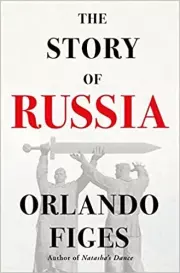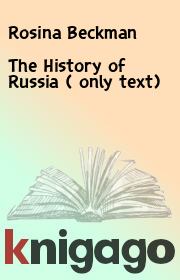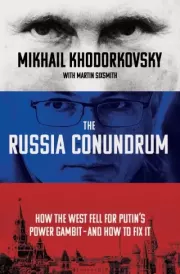Encyclopaedia Britannica - Russia
Название: | Russia | |
Автор: | Encyclopaedia Britannica | |
Жанр: | Старинная литература | |
Изадано в серии: | неизвестно | |
Издательство: | неизвестно | |
Год издания: | - | |
ISBN: | неизвестно | |
Отзывы: | Комментировать | |
Рейтинг: | ||
Поделись книгой с друзьями! Помощь сайту: донат на оплату сервера | ||
Краткое содержание книги "Russia"
Аннотация к этой книге отсутствует.
Читаем онлайн "Russia". [Страница - 72]
Studies of important issues in Russian foreign policy and the emergence of the Russian Empire include William C. Fuller, Jr., Strategy and Power in Russia, 1600–1914 (1992); Dietrich Geyer, Russian Imperialism: The Interaction of Domestic and Foreign Policy, 1860–1914, trans. by Bruce Little (1987; originally published in German, 1977); Andreas Kappeler, The Russian Empire: A Multiethnic History, trans. by Alfred Clayton (2001; originally published in German, 1992); Dominic Lieven, Empire: The Russian Empire and Its Rivals (2000, reissued 2003); and Geoffrey Hosking, Russia: People and Empire, 1552–1917 (1997). Nicholas V. Riasanovsky Dominic Lieven Russia from 1905 to 1917
An excellent general introduction to the period is Hans Rogger, Russia in the Age of Modernisation and Revolution, 1881–1917 (1983). Foreign policy is the subject of Barbara Jelavich, Russia’s Balkan Entanglements, 1806–1914 (1991, reissued 2002); David MacLaren McDonald, United Government and Foreign Policy in Russia, 1900–1914 (1992); and Dominic Lieven, Russia and the Origins of the First World War (1983). Dominic Lieven, Russia’s Rulers Under the Old Regime (1989), offers a collective portrait of the policy makers. The economy of the period is examined in Peter Gatrell, The Tsarist Economy, 1850–1917 (1986).
The Revolution of 1905 is addressed in Abraham Ascher, The Revolution of 1905, 2 vol. (1988–92); and Andrew M. Verner, The Crisis of Russian Autocracy: Nicholas II and the 1905 Revolution (1990). A more comparative socioeconomic approach to the revolution is demonstrated in Teodor Shanin, The Roots of Otherness: Russia’s Turn of Century, 2 vol. (1986), which concentrates especially on the peasantry. The reaction of the elites to the revolution is analyzed in Roberta Thompson Manning, The Crisis of the Old Order in Russia: Gentry and Government (1982). The politics of the new parliament, the Duma, is outlined in Geoffrey A. Hosking, The Russian Constitutional Experiment: Government and Duma, 1907–1914 (1973); and the social dimension of the new politics is examined in Leopold H. Haimson (ed.), The Politics of Rural Russia, 1905–1914 (1979); and Victoria E. Bonnell, Roots of Rebellion: Workers’ Politics and Organizations in St. Petersburg and Moscow, 1900–1914 (1983). Russia’s problems during World War I are described in Michael T. Florinsky, The End of the Russian Empire (1931, reprinted 1973). The revolutionary period is the subject of Orlando Figes, A People’s Tragedy (1996, reissued 1998). Geoffrey Alan Hosking Dominic Lieven Soviet Russia
For the Soviet period there are hardly any specific histories of Russia, which is always treated in the wider context of the Soviet Union. An overview of the Revolution of 1917 and its consequences is offered in Sheila Fitzpatrick, The Russian Revolution, 2nd ed. (1994, reissued 2001). Robert Service, A History of Twentieth-Century Russia (1998), is an excellent one-volume history of the Soviet state. Christopher Read, The Making and Breaking of the Soviet System (2001), provides a stimulating analysis of the causes of the rise and fall of the Soviet Union. Relevant historical biographies include Robert Service, Lenin: A Biography (2000); Robert C. Tucker, Stalin as Revolutionary, 1879–1929 (1973), and Stalin in Power, 1928–1941 (1990); and William J. Tompson, Khrushchev: A Political Life (1995, reissued 1997). Chris Ward (ed.), The Stalinist Dictatorship (1998), is a readable examination of the Stalinist period. The Gorbachev era is analyzed in Archie Brown, The Gorbachev Factor (1996); Stephen White, After Gorbachev, 4th ed. (1994), a solid narrative of the years of perestroika; Richard Sakwa, Gorbachev and His Reforms, 1985–1990 (1990); Jeffrey F. Hough, Democratization and Revolution in the USSR, 1985–1991 (1997); and Mikhail Gorbachev, Perestroika: New Thinking for Our Country and the World, new, updated ed. (1988), and Memoirs (1996), which reveals insights into Gorbachev’s thinking. Good introductions to the Soviet political structure and situation are Richard Sakwa, Soviet Politics in Perspective, 2nd ed. rev. (1998); Gordon B. Smith, Soviet Politics: Struggling with Change, 2nd ed. (1992); Geoffrey Ponton, The Soviet Era: Soviet Politics from Lenin to Yeltsin (1994); and Evan Mawdsley and Stephen White, The Soviet Elite from Lenin to Gorbachev: The Central Committee and Its Members, 1917–1991 (2000), a wide-ranging survey. Alec Nove, An Economic History of the USSR, 1917–1991, 3rd ed. (1992), is an informed, accessible account. The breakup of the Soviet Union is the subject of Ronald Grigor Suny, The Revenge of the Past: Nationalism, Revolution, and the Collapse of the Soviet Union (1993); and Roman Szporluk, Russia, Ukraine, and the Break-up of the Soviet Union (2000). Foreign policy is discussed in Gabriel Gorodetsky (ed.), Soviet Foreign Policy, 1917–1991: A Retrospective (1994). Vladislav Zubok and Constantine Pleshakov, Inside the Kremlin’s Cold War: From Stalin to Khrushchev (1996), uses archival material released in the 1990s to examine the Cold War and its origins from the Soviet point of view. The secret police’s role during the Soviet period is the subject of Amy W. Knight, The KGB: Police and Politics in the Soviet Union, rev. ed. (1990). Martin McCauley Dominic Lieven Post-Soviet Russia
Interpretative surveys include Lilia Shevtsova, Yeltsin’s Russia: Myth and Reality (2000); Stephen White, Alex Pravda, and Zvi Gitelman (eds.), Developments in Russian Politics 5, 5th ed. (2001); and Archie Brown (ed.), Contemporary Russian Politics: A Reader (2001). Studies of the economic transition include Andrei Shleifer and Daniel Treisman, Without a Map: Political Tactics and Economic Reform in Russia (2000); Alena V. Ledeneva, Russia’s Economy of Favours: Blat, Networking, and Informal Exchange (1998); Jefferey F. Hough, The Logic of Economic Reform in Russia (2001); Thane Gustafson, Capitalism Russian-Style (1999); Peter Reddaway and Dmitri Glinski, The Tragedy of Russia’s Reforms: Market Bolshevism Against Democracy (2001); and Tim McDaniel, The Agony of the Russian Idea (1996). Geoffrey Hosking and Robert Service (eds.), Russian Nationalism, Past and Present (1997), examines the reemergence of Russian identity since the collapse of the U.S.S.R. The conflict in Chechnya is explored in John B. Dunlop, Russia Confronts Chechnya: Roots of a Separatist Conflict (1998); and Anatol Lieven, Chechnya: Tombstone of Russian Power (1998). A solid account of Russian foreign policy in the Yeltsin years is Ted Hopf (ed.), Understandings of Russian Foreign Policy (1999).
Leon Aron, Yeltsin: A Revolutionary Life (2000), is an excellent biography. The institutional and political context in which Russian democracy emerged in the 1990s is the subject of Graeme Gill and Roger D. Markwick, Russia’s Stillborn Democracy?: From Gorbachev to Yeltsin (2000); Gordon B. Smith (ed.), State-Building in Russia: The Yeltsin Legacy and the Challenge of the Future (1999); and Valerie Sperling (ed.), Building the Russian State: Institutional Crisis and the Quest for Democratic Governance (2000). Dominic Lieven
--">Книги схожие с «Russia» по жанру, серии, автору или названию:
 |
| Orlando Figes - The Story of Russia Жанр: Старинная литература Год издания: 2022 |
 |
| Rosina Beckman - The History of Russia ( only text) Жанр: Старинная литература Год издания: 101 |
 |
| Mikhail Khodorkovsky-ua - The Russia Conundrum - Mikhail Khodorkovsky-ua Жанр: Старинная литература Год издания: 2022 |


